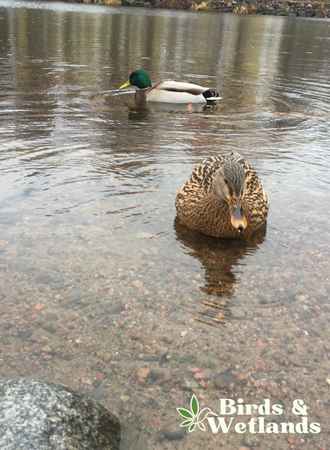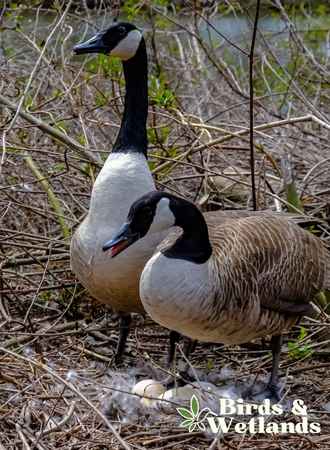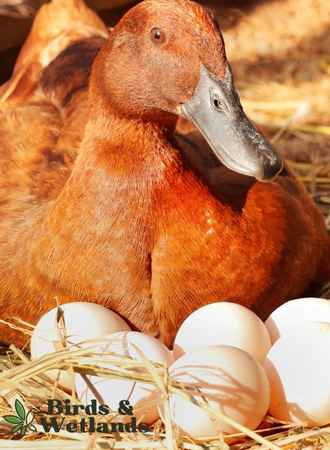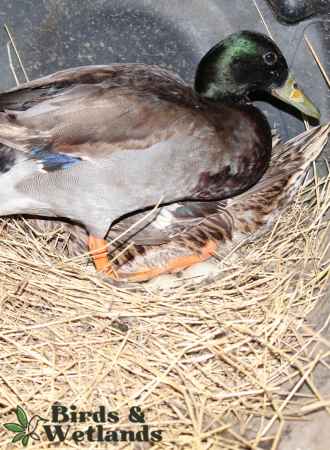Ducks do not typically lay their eggs in water. They prefer to build their nests on land, in well-hidden and protected areas such as tall grass, bushes, or even tree cavities. Ducks choose these locations to help camouflage their nests and protect their eggs from potential predators.
Once the female duck lays her eggs, she will incubate them for about 23-30 days, depending on the duck species, until they hatch.
Key Takeaways on Do Ducks Lay Eggs in the Water
- Ducks build nests on dry land or on the ground, using grass and twigs to create a safe and comfortable place for their eggs.
- Ducks usually build their nests close to a water source such as ponds or lakes, so the ducklings will have easy access to food and shelter after they hatch.
- Ducks carefully choose where they build their nest to avoid predators and to make the entire duration of the incubation process easy for them.
Why Do Some Ducks Lay Their Eggs in the Water?

Ducks and other waterfowl such as geese and swans don’t normally lay eggs in the water. However, some ducks, especially those that are not broody, may unintentionally lay their eggs in the water.
Some ducks will lay eggs anywhere, everywhere. Some first layers need guidance on where to lay their eggs. If your ducks have laid eggs in the water or in the kiddie pool, make sure to collect them.
Where Do Ducks Lay Their Eggs?
Domesticated ducks will lay their eggs in a nesting box while wild ducks typically lay eggs in nests on the ground near water. The duck nest is usually a simple bowl of grass and down, lined with more down plucked from the female’s breast and this is where a duck lays her eggs in the spring.
Females will incubate her eggs for 28 days or a month, during which time she will barely leave the nest except to eat and drink.
Once the ducklings hatch, they follow their mother and quickly learn to swim and forage for food. However, they often stay close to their mother for several months before striking out independently.
How Can I Tell if a Duck Is Laying?
One of the most common questions asked by new duck owners is how to tell if their duck is about to begin laying. It is perfectly normal for a female duck to start laying eggs when she is about five to six months old. Heavier duck breeds may start laying at a later age.
While there are a few different methods, one of the easiest is to simply observe your duck’s behavior. Generally, ducks will start to act differently when they are ready to lay.
They may become more withdrawn and spend more time alone, or they may become more aggressive and territorial. You may notice that your duck’s vent becomes larger and redder.
If you suspect that your duck is about to lay, you can check for eggs by gently feeling around her vent area. With a little practice, you’ll be able to tell if your duck is laying with ease.
Ducks will continue laying eggs after they laid their first egg and will only stop laying eggs a few years before they succumb to old age.
Woodlink Cedar Duck Nesting Box
Attract ducks to your wetland area and provide them with a cozy, secure nesting space using the expertly crafted Woodlink Cedar Duck House, made with high-quality materials in the USA.

Pros
- Ornithologically designed: This nesting box is specifically created for ducks, ensuring an optimal environment for them to thrive.
- High-quality materials: Made from re-forested, kiln-dried, inland red cedar, the Woodlink Cedar Duck House is both durable and eco-friendly.
- Easy to install: The nesting box comes fully assembled, with screws included for quick and easy mounting.
- Made in the USA: Take pride in knowing that you are supporting a product that is made domestically, ensuring top-notch quality and craftsmanship.
- Versatile use: While designed specifically for ducks, this nesting box can also be occupied by other species like screech owls, squirrels, and pileated woodpeckers.
Cons
- Mounting height: Users must research and choose the appropriate mounting height (usually 4-6 feet above the ground) and install a baffle on the post to deter predators like raccoons and cats.
- Limited viewing access: Although the front of the box can be opened for viewing, it is important not to disturb nesting birds, which may limit opportunities for observation.
What Are the Common Nest Spots for Ducks?

Ducks are creatures of habit, and they typically return to the same nesting areas year after year in the spring. Common nesting spots for ducks include marshes, ponds, and lakes. These spots usually have an abundant and reliable food supply.
Ducks also like to build an entire nest in areas with plenty of vegetation, as the plants provide shelter and camouflage for their eggs or in a natural hole in a tree. In urban areas, ducks may nest in parks or along rivers and streams.
While ducks will use just about any type of nest site, they prefer locations that offer some protection from predators and the elements. Many ducks will build their nests in hollow trees, bushes, or rocky crevices. However, some ducks build their nest in unfavorable locations such as courtyards and roof gardens.
By understanding the habits of ducks, it is possible to identify potential nesting sites and help protect these popular animals.
Where Do Ducks Lay Their Eggs?
Ducks are known for their associations with water, and it should be no surprise that their nests are usually built near town ponds, lakes, or other water sources during nesting season. The female duck will carefully construct her nest out of grasses, twigs, and down feathers, ensuring to line it with soft materials to keep her eggs warm.
Once the nest is complete, she will lay all the eggs and begin incubating them and will only leave to eat and drink. They will take advantage of the open water and vegetation as protection against potential predators and as food sources.
Can a Duck Egg Survive in Water?
To hatch, a duck egg needs a constant temperature of around 99 degrees Fahrenheit and high humidity. If the egg is exposed to cold and damp weather, the chances of successfully hatching are slim. The egg will need to be incubated for 28 days for the embryo to develop properly.
The egg must be turned several times daily during the incubation period, so the embryo doesn’t stick to the shell. If the egg is not turned, the embryo will suffocate and die. Once the 28 days or so have passed, the duckling will hatch.
FAQs on Ducks Laying Eggs
What Is the Range of Clutch Size of Duck Eggs?

The typical clutch size for a nesting duck is anywhere from 6 to 12 eggs. However, this number can vary depending on the breed of duck. For example, the Mallards and other ducks have between 9 and 12 eggs per clutch. However, in some instances, Mallards may only lay five eggs. Large duck species, such as the Muscovy, can lay up between 8 to 16 eggs per clutch or maybe even more eggs.
Regardless of the breed, all breeding ducks will sit on their eggs (even if dead or damaged eggs) until they hatch, which usually takes around 28 days. During this time, the mother duck will not leave the nest and will only leave to feed and drink very briefly.
Once the eggs have hatched, the mother duck will lead her chicks to water and teach them how to find food. And within just a few weeks, these chicks will be fully independent.
What Time of Day Do Ducks Lay Eggs?

For many animals, the time of day is dictated by the sun’s rising and setting. However, ducks are creatures of habit and tend to lay their eggs at the same time each day, regardless of the light levels.
For most ducks, this means laying their eggs during the night or early morning. This ensures that the eggs will be hidden from predators and have plenty of time to incubate during the warmer daytime hours.
In addition, laying an egg early in the day gives female ducks a chance to replenish their energy levels before they have to start foraging for food again. So, if you were to collect eggs, do so in the morning. It’s important to note that these birds will be laying one egg every one or two days.
Can You Move Duck Eggs Out of the Nest?
During the breeding season, you should not be chasing ducks away especially if they already started nesting. Remember that the laying period can be stressful for these birds. In most cases, they lay more than half of their body weight in eggs.
It is illegal to remove wild duck eggs from the nest, especially from protected duck species such as Muscovy ducks. The U.S. Fish and Wildlife Service strictly prohibits taking ducks’ eggs without a permit, which can only be obtained for scientific or educational purposes.
Duck eggs are a nutritious food source that is high in protein and low in cholesterol. They can be used in many different recipes, including omelets, quiche, and custards. Duck eggs can also be pickled or smoked.
If you find a nest of duck eggs and want to move them to a safer location, you can do so as long as you take the proper precautions. Make sure to wear gloves when handling the eggs, and place them in an incubator or brooder as soon as possible. Keep the eggs at a consistent temperature and humidity, and do not turn them more than once per day.
What Do Males Do While the Female Ducks Are Incubating Eggs?
Males usually stand guard nearby while the females incubate their eggs.

